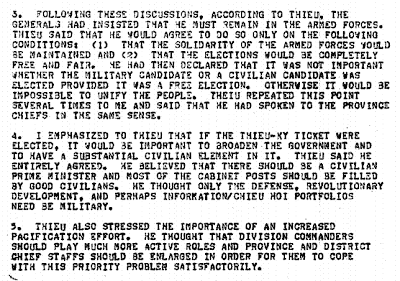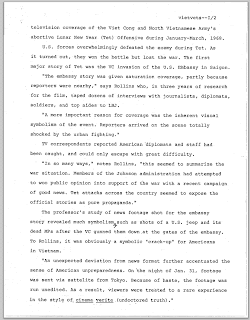To accept unequivocally what someone else views as right, when it is not right, nor just, makes me what?
That question is difficult to answer when the acceptance is fundamentally offering your blood for something. I am pretty sure that most people would think it reasonable question why they were being asked to do something with that as its ultimate cost. And as the cost rose the questions of why would become more and more relevant to making a decision. So why is questioning one's duty in a war off-limits or taboo?
Heck I know the primary answer to that. War takes bodies. Lots and lots of bodies. More bodies than will come from those who see the effort as something they actually want to do. You can't go to war without troops and you can't have the troops you require if some question the purpose and refuse to participate. So it has always been framed as; do your duty for your country.
Vietnam, however, exposed an ugly side of America and that duty. That is, what we were doing there had more to do with other, less noble reasons, than what we had been told we were spending blood and treasure for.
When I asked the question:
Does my duty include shedding my blood so that Richard Nixon would not be the first president to lose a war, a relevant reason to do so?It gets even harder to answer when you ask the question:
Does my duty to shed my blood for my country's honor make it a relevant reason to do so?Still harder is to ask the question:
Is it my duty to do whatever it takes to provide honor and dignity to those who have fought and died before me in this effort?That last one is what I have come to now understand may be the reason why some - I call them absolutists - are still bothered by those who dared to question our effort and specifically towards those who worked towards ending the war without a definitive "win."
Here, once again, is what General Brady said in his commentary that started me down this journey and these many blog posts:
The American soldier was never defeated on the battlefield in Vietnam; our defeat came from the elite in the courtrooms, the classroom, the cloakrooms and the newsrooms, from cowardly media-phobic politicians and irresponsible, dishonest media and professors from Berkeley to Harvard.Now let's look at what the Swift Boat Vets have to say about John Kerry's 1971 speech to congress:
Sen. John Kerry's 2004 presidential bid became the catalyst for an unprecedented political movement by Vietnam veterans who had long resented his false 1971 testimony that American troops routinely committed war crimes.
During the Vietnam War, the original television networks and the leading liberal newspapers were near the peak of their formidable persuasive powers, able to dominate public opinion to an extent difficult to imagine today. In an age without cable news networks, conservative talk radio or the Internet, they were the only game in town. What these organizations chose to cover became news, and what they ignored did not. They used that power to instill Kerry's false portrait of American veterans as misfits, drug addicts and baby killers into the popular culture.
When John Kerry made his service in Vietnam the cornerstone of his presidential campaign during the 2004 election, the wounds he had inflicted on millions of Vietnam veterans were re-opened. Many could no longer be silent while a man who had repeated the propaganda of America's enemies rose to the position of Commander-in-Chief.Now there was another ulterior motive to this, and that was to smear the guy some did not want for president. But the criticism directed at him is nonetheless the same vitriol spewed out towards others who took the same tone. And yes, I chose those words purposely because it pisses me off that some believe I have no right to question the cost in blood and treasure.
Here is what I take issue with:
In an age without cable news networks, conservative talk radio or the Internet, they were the only game in town. What these organizations chose to cover became news, and what they ignored did not.What that statement postulates is this: Had they controlled the message, public opinion would have been different and the outcome would have been different as well. Okay...I'll buy that as a possibility. Now let me ask four questions:
- Had the news of Tet and General Loan's execution of Nguyen Van Lem been reported by conservative reporters, would there have been a different story reported?
- Would the way conservative outlets have reported that news changed public opinion?
- If all the reporting was "liberal" and that reporting had "formidable persuasive powers" would replacing it with a "conservative" methodology generate the same "formidable persuasive powers" "to dominate public opinion?"
- Had the media and message been controlled and dominated by conservative media, and public opinion come to the same conclusion, would Walter Cronkite, Robert Kennedy, and John Kerry still be seen as pariahs by the right?
Basically, does manipulation of public opinion meet with approval if the end result is to my liking? To assume that one side manipulated public opinion presenting a "false" impression also requires one to assume that the other side would manipulate public opinion by presenting what it deems as the truth. That is, once again, had we shown the film of General Loan shooting Nguyen Van Lem and told the viewers, as Rollins contends:
 |
| Rollins: Television's Vietnam - The visual language of Television News |
What would have changed if we had been told the statement that was more than likely designed to convey a context more forgiving of the General? (see blog post).
"Many Americans have been killed these last few days and many of my best Vietnamese friends. Now do you understand? Buddha will understand."After all, we had been told what the General had said the day before in most major newspapers:
"They killed many Americans and many of our people."How would that have changed the picture and made it "more complex?" Well I think I may understand why folks like Rollins and Culbert think so. Look at this statement from Rollins:
"No one noted at the time - and few noted later - that, at that very moment General Loan was shooting a single ununiformed soldier, North Vietnamese soldiers were systematically executing 2800 South Vietnamese civilian government and public school teachers outside the city of Hue."Now look at Culbert's paper:
 |
| Culbert: Television's Visual Impact on Decision Making in the US, 1968 |
Now look at General Brady's San Antonio Express News article:
"And it was unlikely that the civilians would rise up for a party that massacred 3,000 innocent men, women, children and religious in Hue; some who were buried alive and clubbed to death to save ammunition. Who saw that in our media?"Here is what I see. Had the "conservative" side of the story been reported, that is, had we been told about the atrocities of the other side we would have concluded that they paled in comparison to what General Loan did.
If they killed 3000 citizens and we killed 2000, would that context change how we should view what we did?
Look at the context the New York Times did to try and blunt the force of the Eddie Adams photo:
 |
| NY Times Feb 2, 1968 |
 |
| Culbert: Television's Visual Impact on Decision Making in the US, 1968 |
"I respect the Vietcong in uniform. They are fighting men like me. People know when they are wounded I take care of them. I see they get to to the hospital. But when they are not in uniform, they are criminals and the rule of war is death." (Harper's April 1972 article "Portrait of an Aging Despot" page 72)Which begs the question: why were people: "looking for a reason to change their views on a matter of policy?"
Maybe the context was there all the time. Maybe what was said, what we were told to believe, what we held as sacred and honorable, was not taking place. Maybe all the "elite in the courtrooms, the classroom, the cloakrooms and the newsrooms, from cowardly media-phobic politicians and irresponsible, dishonest media and professors from Berkeley to Harvard" did was show us what we suspected, but hoped wasn't the case.
Which begs one more question: what would the "cable news networks, conservative talk radio or the Internet" have done differently?
Was the press "misleading" on the General Loan shooting? Would the conservative press present it differently. or, recognizing its potential impact, suppress it? Is the public better served seeing flag-draped coffins of soldiers killed in combat or should that be off limits?
Which brings me to the question posed in the title of this blog. Did John Kerry inflict wounds on millions of vets because of what he said on April 22, 1971? Culbert believes the General Loan footage and photograph were misleading. General Brady contends that the media and and "professors from Berkeley to Harvard" were "dishonest." The swift boat vets claim that what John Kerry said to Congress was a "false portrait of American veterans."
"Misleading", "dishonest", and "false". Which taken together would seem to indicate that the truth has not been told. I think I have presented enough information on what was actually said about General Loan and what the CIA and Jonson knew about the situation in Vietnam. What I have not addressed is Swift Boat Vets for Truth's contention that John Kerry was a big fat liar on April 22, 1971.
Next post: What did John Kerry say on April 22, 1971 that was false?



















